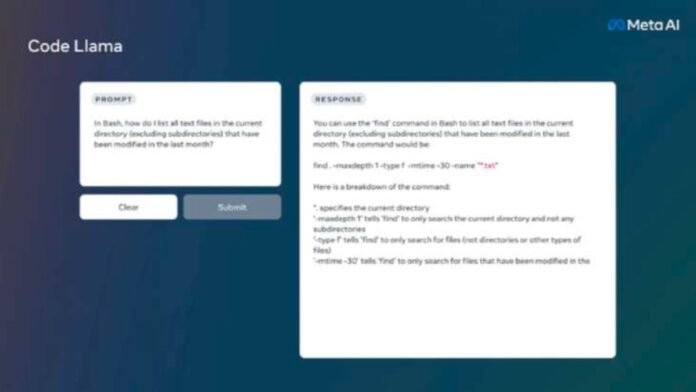Meta has introduced Code Llama, its newest AI advancement, with the goal of revolutionizing code production and debugging. The huge language model Llama 2, which has been tailored for coding activities, is the basis of this new tool. Through text prompts, Code Llama may effectively generate and evaluate code, speeding developer workflows and improving accessibility of coding for non-programmers.
Code Llama gives programmers the chance to make more reliable and thoroughly documented software, with potential uses in both productivity improvement and education. The tool may help with code completion and debugging while also producing code and natural language explanations for code. Numerous programming languages are supported by it, including Python, C++, Java, PHP, Typescript (JavaScript), C#, Bash, and others.
Three sizes of Code Llama models—7B, 13B, and 34B parameters—are included in the Meta version. 500 billion tokens of code and accompanying data were used to train each of these models. These approaches provide flexibility across various usage situations by accommodating changing serving and latency needs.
The main objective of Code Llama is to streamline developer workflows by eliminating tedious coding activities. Programmers may now concentrate on more imaginative and human-centered areas of their profession as a result. The tool is ready to assist software developers working in a range of industries, including business, open-source initiatives, non-governmental organizations, and research.
In conclusion, Meta’s Code Llama stands out as a game-changing solution, utilizing AI to completely alter how code is created, explained, and debugged. This discovery has the potential to speed up the coding process and make coding instruction more accessible, ultimately changing the software development environment.
Conclusion:-
Meta has introduced Code Llama, an AI tool designed to revolutionize code production and debugging. The tool uses the Llama 2 language model for coding activities, generating and evaluating code through text prompts, speeding developer workflows and improving accessibility for non-programmers. It supports various programming languages, including Python, C++, Java, PHP, TypeScript, C#, and Bash. The Meta version includes three sizes of Code Llama models, each trained with 500 billion tokens of code and data. The main goal is to streamline developer workflows by eliminating tedious coding tasks, allowing programmers to focus on more creative and human-centered areas. Code Llama is suitable for various industries, including business, open-source initiatives, non-governmental organizations, and research.



